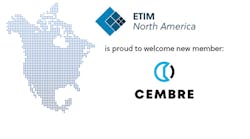A reference to point-of-sale information in your "Living Large" article in the September 1999 Electrical Wholesaling (page 24) prompted me to compare how differently POS is used by electrical and electronics distributors. As a member of both the National Electrical Manufacturers Representatives Association (NEMRA) and the Electronics Representatives Association (ERA), and as president of NEMRA's Illinois chapter, I've had many opportunities to look at the way point-of sale (POS) works (and doesn't work) in our industry.
As an independent manufacturers' representative dealing with both electrical and electronics distributors, I have an excellent vantage point from which to watch two very different kinds of distributors attack the same issues very differently. Most electrical distributors fight any suggestion that they share POS information with manufacturers or representatives. Electronics distributors provide point-of-sale data as a matter of routine, sometimes without the manufacturer or independent rep even requesting it.
Are the electronics distributors crazy to share confidential customer information with their partners? Don't manufacturers and reps, with access to this kind of information, switch business to their "favorite" distributors or use it to take business direct? Intuitively, it might seem that this would happen. As is often the case, a careful evaluation ofthe intuitive answer reveals that it is dead wrong. In practice, POS reporting actually decreases a manufacturer's or rep's incentive to move business between distributors or take it direct.
Looking at the example of electronics distributors, any loss resulting from sharing POS information is vastly outweighed by the increased levels of service well-informed manufacturers and reps can provide. The most important benefit of POS information is that it allows rep and direct factory salespeople to be compensated based on how much business they can refer to local distributors.
Although compensation of rep and factory salespeople may sound like something that is "not my problem" for most electrical distributors, it should be a major concern, because bad compensation programs are the primary cause of friction between electrical wholesalers and rep or factory salespeople.
Why should an electrical distributor care about how reps and direct factory salespeople are paid? Because rep or factory salespeople do what they are paid to do, and a bad compensation program pays them to do the wrong things.
Reviewing some real examples of compensation programs used by rep companies or direct sales forces when POS information is not available shows how the lack of POS hurts electrical distributors. One common way to pay rep or direct salespeople is to assign one salesperson to each distributor, and to pay that salesperson based on what the distributor buys. This can work for commodities, but it's disastrous when the rep or direct salesperson works to develop an original equipment manufacturer's (OEM) print position or user brand preference.
In order to earn a commission, the salesperson has to get a product specified and also force the OEM or user to buy from a particular distributor. Actual results of this system include:
1) Time that a salesperson should have spent with engineers will be wasted pushing OEMs or users to buy from a specific distributor.
2) Salespeople within the same rep company or from the same factory will compete with each other on price to get orders to a favored distributor.
3) In addition to competing with other salespeople in their office on price for this order, independent reps and direct factory salespeople will squeeze the distributor to take the lowest possible margin to make their distributor's price better than prices from other distributors in the same market.
4) OEMs and users will face unprofessional pressure to buy from a specific distributor, even if that distributor is not the best one to serve their needs.
5) Distributors who want to pursue a particular OEM or user will have to deal with "their" salesperson instead of the salesperson who knows the account best.
6) If two different distributors want to work on the same OEM or user, two salespeople from the same rep company or factory may end up calling on the same account.
The bottom line is that the lack of POS has created a lot of situations in which rep and direct factory salespeople are involved in counterproductive activities, or just waste time that could have been spent supporting distributor partners.
Another way that companies compensate their salespeople is by putting all distributor sales into a pool, while commissions on all direct sales are paid to the rep or direct salesperson who writes the order. The result: Every salesperson knows that he or she gets all of the credit for direct sales, but only a small piece of sales through distribution. Suddenly, direct sales soar and sales through distribution plummet. Other companies work on straight salary or pool all of the commissions. This requires very careful management so that everyone gets as fair a share of the commissions as possible.
Once POS information is uniformly reported to manufacturers and independent manufacturers' reps, all of the incentives to move business between distributors and most of the reasons that distributor business gets taken direct will go away. Eventually, more electrical wholesalers are going to grit their teeth and start following the lead of electronic distributors by providing POS information to manufacturers and independent manufacturers' representatives.
Although there undoubtedly will be some misuse of POS information in the beginning, the potential problems will be far outweighed by the benefits. It's a heretical idea to many electrical distributors, who remain convinced that their customer information is too important a competitive advantage to share with "outsiders." The more that POS information flows to manufacturers and representatives, the more they will be partners instead of "outsiders," and benefits electrical distributors will enjoy from working with true partners will have made POS worth the effort.








